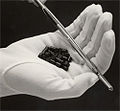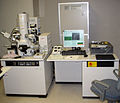Nuclear engineering: Difference between revisions
Oxymoron83 (talk | contribs) m Reverted edits by 168.169.86.91 (talk) to last version by SmartGuy |
|||
| Line 209: | Line 209: | ||
|} |
|} |
||
F U C K!! |
F U C K!! |
||
== List of universities in Canada offering nuclear engineering degrees == |
|||
SUCK SOME BIG COCK PLAEASE !!!!! |
|||
{|class="wikitable" border="1" cellpadding="1" |
|||
|- |
|||
! rowspan=1|'''College'''||rowspan=1|'''Department''' (external links)|| rowspan=1|'''Degrees offered''' |
|||
|- |
|||
|[[University of Ontario Institute of Technology]], [[Oshawa]] |
|||
|[http://www.engineering.uoit.ca/undergraduate/nuclear/ Nuclear Engineering] |
|||
|B.Eng |
|||
|- |
|||
|[[McMaster University]], [[Hamilton, Ontario|Hamilton]] |
|||
|[http://engphys.mcmaster.ca/ Engineering Nuclear Physics] |
|||
|B.Eng.Phys., Dipl.Nuc.Tech, M.Eng, M.A.Sc, Ph.D. |
|||
|- |
|||
|[[Royal Military College of Canada]], [[Kingston, Ontario|Kingston]] |
|||
|[http://www.rmc.ca/academic/grad/index_e.html Department of Chemistry and Chemical Engineering] |
|||
|M.Sc, M.A.Sc, M.Eng, PhD |
|||
|} |
|||
== List of colleges in India offering nuclear engineering degrees == |
== List of colleges in India offering nuclear engineering degrees == |
||
Revision as of 18:32, 9 April 2008
Nuclear engineering is the application of the breakdown of atomic nuclei and/or other sub-atomic physics, based on the principles of nuclear physics. It includes, but is not limited to, the interaction and maintenance of nuclear fission systems and components— specifically, nuclear reactors, nuclear power plants, and/or nuclear weapons. The field may also include the study of nuclear fusion, medical and other applications of (generally ionizing) radiation, nuclear safety, heat/thermodynamics transport, nuclear fuel and/or other related (e.g., waste disposal) technology, nuclear proliferation, and the effect of radioactive waste or radioactivity in the environment.
Typical training
The examples and perspective in this section on training in nuclear engineering may not represent a worldwide view of the subject. |
The following is the typical coursework included in most U.S. nuclear engineering degree programs.
College preparation
As with any engineering discipline, college preparation should include mathematics training through the beginnings of calculus, as well as introductory courses in physics and chemistry. and u must have a nice big juicy hairsy cock :)
Undergraduate coursework
Undergraduate coursework should begin with a foundation in mechanics and dynamics of partmotion, thermodynamics, introductory computer programming, college level physics and chemistry, and a rigorous training in mathematics through differential equations.
Midway through undergraduate training a nuclear engineer must choose a specialization within his or her field that he or she will further study. Further coursework in a nuclear engineering program includes but is not limited to fluid mechanics, reactor physics, quantum mechanics, thermal hydraulics, linear circuits, radiation effects, and neutron transport.
Specialization in fission includes the study of nuclear reactors, fission systems, and nuclear power plants, the primary teachings deal with neutronics and thermal-hydraulics for nuclear generated electricity. A firm foundation in thermodynamics and fluid mechanics in addition to hydrodynamics is a must.
Specialization in nuclear fusion includes electrodynamics and plasmas. This area is very much research oriented and training often terminates with a graduate level degree.
Specialization in nuclear medicine includes courses dealing with doses and absorption of radiation in bodily tissues. Those who get competency in this area usually move into the medical field. Many nuclear engineers in this specialization go on to become board licensed medical physicists or go to medical school and become a radiation oncologist. Research is also a common choice for graduates.
Naval Nuclear Power School
The US Navy runs a program called Naval Nuclear Power School to train both officers and enlisted sailors for nuclear plant operation. While some officers have undergraduate backgrounds in nuclear engineering, any officers who take the requisite math and science classes are also accepted, whereas most of the enlisted students hold no college degrees at all. Despite this, they are prepared, through a rigorous training program (lasting between 65 weeks for Machinist's Mates and eighteen months for Electronics Technicians and Electrician's Mates), to operate the nuclear and steam plants aboard the navy's submarines and aircraft carriers. This training does not carry a Department of Energy certification, although many sailors choose to work at civilian power plants after their six-year obligations are completed.
-
USS Virginia, a Virginia-class nuclear attack (SSN) submarine
-
USS Ronald Reagan (CVN-76)), the ninth and penultimate Nimitz-class supercarrier
Professional areas
Nuclear fission
Nuclear fission is the disintegration of a fissionable atom nuclei into two different elements nucleus. An approximate number of ~2.4 neutrons are scattered around per fission. There are two types of nuclear fission. 1-Fast Fission 2-Thermal fission
Generally, thermal fission is used in commercial reactors, if we disregard the Fast Breeder Type of Nuclear Reactors.
The United States gets about 20% of its electricity from nuclear power. This is a massive industry and keeping the supply of nuclear engineers plentiful will ensure its stability. Nuclear engineers in this field generally work, directly or indirectly, in the nuclear power industry or for government labs. Current research in industry is directed at producing economical, proliferation resistant reactor designs with passive safety features. Although government labs research the same areas as industry, they also study a myriad of other issues such as: nuclear fuels and nuclear fuel cycles, advanced reactor designs, and nuclear weapon design and maintenance. A principal pipeline for trained personnel for US reactor facilities is the Navy Nuclear Power Program.
-
Nuclear Powerplant
-
B-61 thermonuclear weapon
Nuclear fusion and plasma physics
Research areas in nuclear fusion and plasma physics include high-temperature, radiation-resistant materials, and plasma dynamics. Internationally, research is currently directed at building a prototype tokamak called ITER. The research at ITER will primarily focus on instabilities and diverter design refinement. Researchers in the USA are also building an inertial confinement experiment called the National Ignition Facility or NIF. NIF will be used to refine neutron transport calculations for the US stockpile stewardship initiative.
-
NIF (National Ignition Facility) target chamber
Nuclear medicine and medical physics
An important field is nuclear medicine. From x-ray machines to MRI to PET, among many others, nuclear medicine provides most of modern medicine's diagnostic capability along with providing many treatment options.
-
X-Ray Image of a male skull
-
Magnetic Resonance Imaging scan of a head
-
PET taken with an ECAT Exact HR+ PET Scanner
Nuclear materials and nuclear Fuels
Nuclear materials research focuses on two main subject areas, nuclear fuels and irradiation-induced modification of materials. Improvement of nuclear fuels is crucial for obtaining increased efficiency from nuclear reactors. Irradiation effects studies have many purposes, from studying structural changes to reactor components to studying nano-modification of metals and semiconductors using ion-beams or particle accelerators.
-
Uranium ore, the principal raw material of nuclear fuel
-
Nuclear fuel pellets
Radiation measurements and imaging
Nuclear engineers and radiological scientists are interested in the development of more advanced ionizing radiation measurement and detection systems, and using these to improve imaging technologies. This includes detector design, fabrication and analysis, measurements of fundamental atomic and nuclear parameters, and radiation imaging systems, among other things.
-
A modern Geiger counter
-
Scintillation detector next to Uraninite
Nuclear engineering organizations
- American Nuclear Society
- International Atomic Energy Agency
- Institution of Nuclear Engineers (London)
List of U.S. colleges offering nuclear engineering degrees
F U C K!!
List of universities in Canada offering nuclear engineering degrees
| College | Department (external links) | Degrees offered |
|---|---|---|
| University of Ontario Institute of Technology, Oshawa | Nuclear Engineering | B.Eng |
| McMaster University, Hamilton | Engineering Nuclear Physics | B.Eng.Phys., Dipl.Nuc.Tech, M.Eng, M.A.Sc, Ph.D. |
| Royal Military College of Canada, Kingston | Department of Chemistry and Chemical Engineering | M.Sc, M.A.Sc, M.Eng, PhD |
List of colleges in India offering nuclear engineering degrees
| College | Department (external links) | Degrees offered |
|---|---|---|
| Indian Institute of Technology, Kanpur | Nuclear Engg and Technology | M.Tech,PhD |
List of colleges in Pakistan offering nuclear engineering degrees
| College | Department (external links) | Degrees offered |
|---|---|---|
| Pakistan Institute of Engineering and Applied Sciences, Islamabad | Department of Nuclear Engineering | MS,PhD |
See also
- Atomic physics
- Nuclear fuel
- Nuclear material
- Nuclear physics
- Nuclear power
- Nuclear reactor
- Thermal hydraulics
- Nuclear Criticality Safety
- Safety engineering












